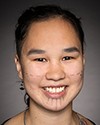Thank you very much, and welcome, everybody.
I am looking forward to later on in this meeting discussing an important motion that is looking at how procurement is taking place for indigenous communities. I'm very concerned that a community here in our region, Mathias Colomb Cree Nation, was told that it would be receiving tents that nobody ever asked for. I think this motion is critical in terms of getting to the bottom of what happened. We know that this has already led to a resignation from the procurement council. It's clear to me that people in the community that I represent deserve answers and that all communities across the country, as we've heard today, require access to much-needed infrastructure that they are asking for right now.
I'd like to shift my question and direct it to both Ms. Campbell and Monsieur Picard.
You were both talking about vulnerable northern regions, and we know that a number of our regions also involve work camps. We know that the outbreak in La Loche started from somebody who came back from the Kearl Lake work camp.
Here in our region, there are four first nations that are standing up against the ramping up of production at the Keeyask Manitoba Hydro work camp. They've done everything possible to keep COVID-19 out, but knowing what's happened elsewhere, we know work camps can be a vector in the spread of COVID-19 to the most vulnerable communities.
Do you share the concerns coming out of first nations that work camps can continue to put first nations at risk during this pandemic?





